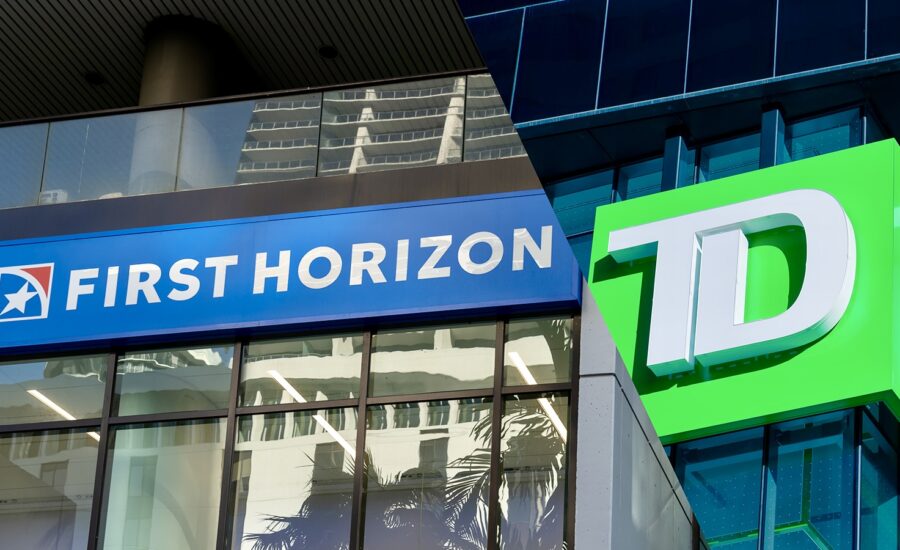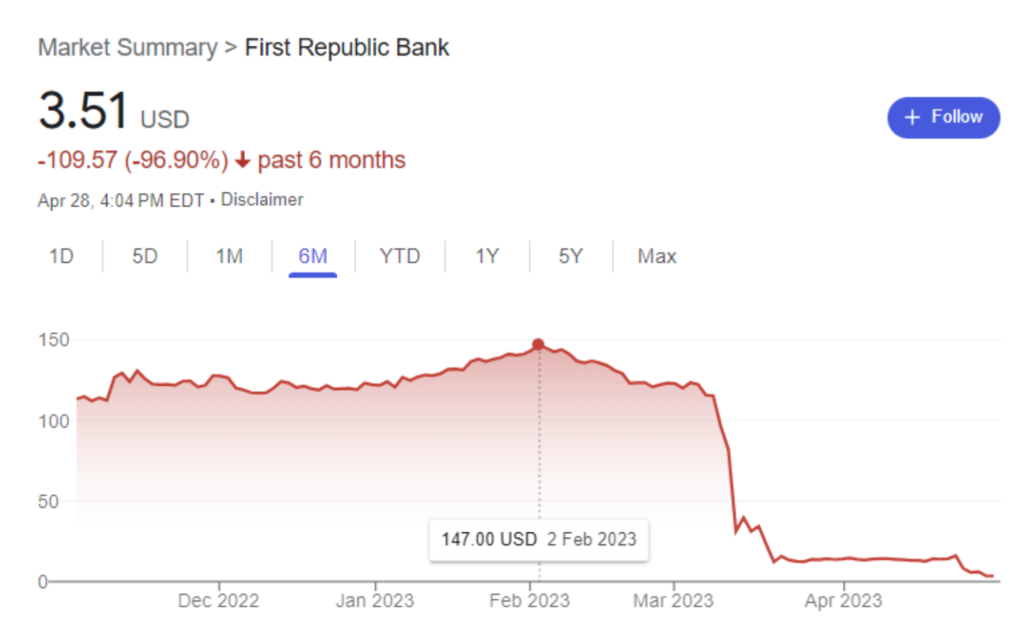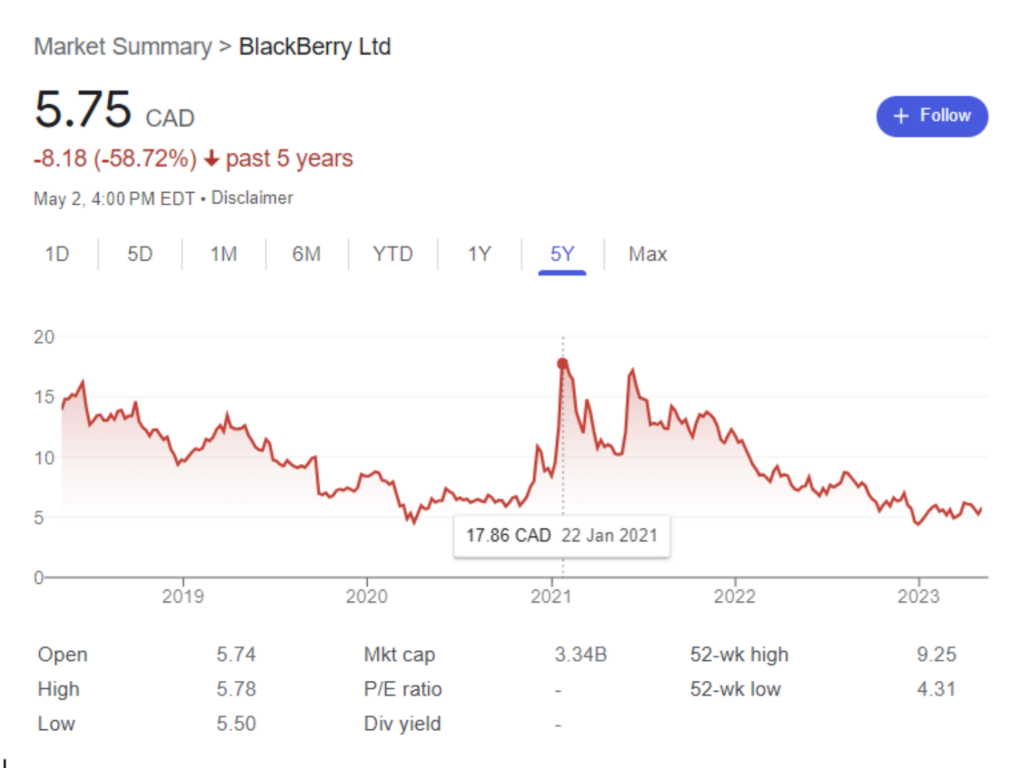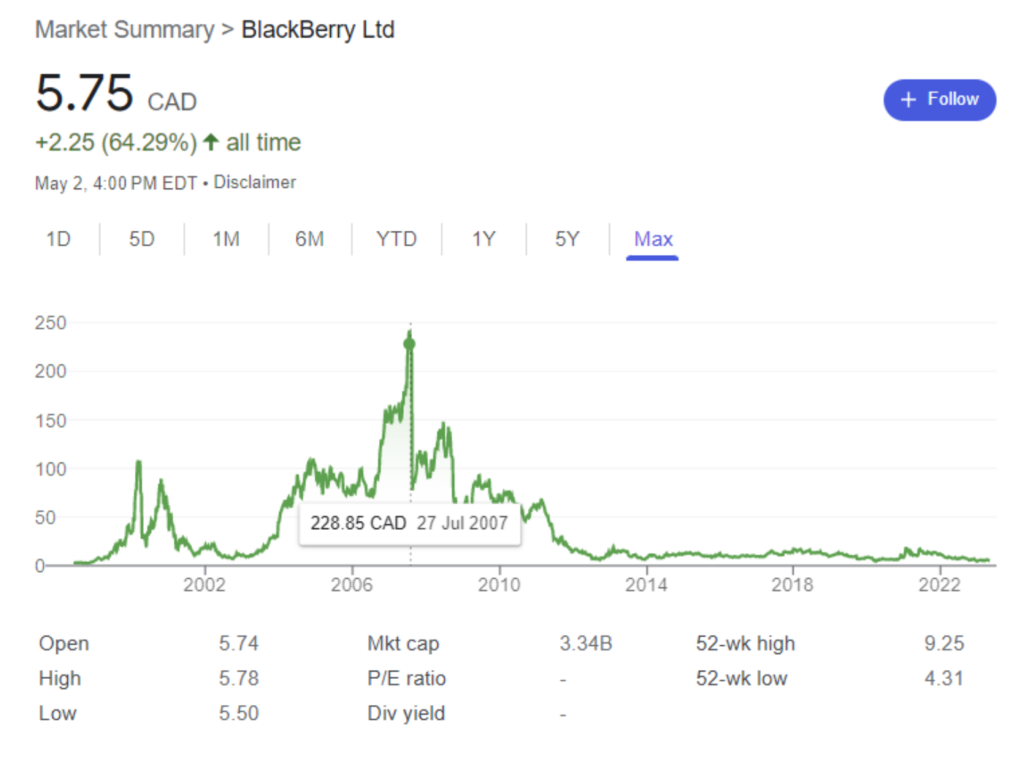Making sense of the markets this week: May 7, 2023

Presented By
Harvest ETFs
Another Fed rate hike, TD sticking with current horizons, Apple keeps posting profits, Shopify gets leaner and Blackberry worth less than sum of its parts.
Advertisement

Presented By
Harvest ETFs
Another Fed rate hike, TD sticking with current horizons, Apple keeps posting profits, Shopify gets leaner and Blackberry worth less than sum of its parts.

Kyle Prevost, editor of Million Dollar Journey and founder of the Canadian Financial Summit, shares financial headlines and offers context for Canadian investors.
A big thanks to Diamond Hands Dale Roberts for so ably stepping in to cover the big market news over the last couple of weeks!
On Wednesday, U.S. Federal Reserve chair Jerome Powell announced that key interest rates would go up from 5% to 5.25%. This rate hike was widely forecasted, and it appeared to have only a minor effect on the broader markets; the Dow Jones Industrial Average (DJIA) declined 0.8% on the day, but the larger Russell 2000 index (reflecting small-cap stocks) actually finished up 0.41%.
In addition to the hike, notable comments from Powell’s announcement include:
“Inflation remains well above our longer run goal of 2%. Inflation has moderated somewhat since the middle of last year, nonetheless inflation pressures continue to run high and the process of getting inflation back down to 2% has a long way to go.”
“We on the committee have a view that inflation is going to come down not so quickly. It will take some time, and in that world, if that forecast is broadly right, it would not be appropriate to cut rates and we won’t cut rates.”
“Wage increases have been moving down, and that’s a good sign. Down to more sustainable levels. I think the case of avoiding a recession is in my view more likely than that of having a recession.”
“A decision on a pause was not made today.”
“Looking ahead, we’ll take a data-dependent approach to determining the extent to which additional policy firming may be appropriate.”
Investors looking for confirmation that we had reached the end of this monetary tightening cycle were likely disappointed. However, it appears that Powell is trying his best to walk the tightrope of reining in bullish expectations, while at the same time not sending the entire banking sector into free fall.
TD Bank (TD/TSX) announced on Thursday that it would be backing off its USD$13.4-billion offer to purchase U.S. bank First Horizon Corp. (FHN/NYSE).
The announcement sent shockwaves through the already-struggling world of U.S. regional banking, as shares of First Horizon collapsed 36%; they now sit at close to USD$10—a far cry from the USD$25 per share that TD had agreed to pay. As part of the initial agreement, TD must now pay First Horizon USD$225 million in breakup and reimbursement fees.
Despite the expensive breakup and decreased expansion opportunities, TD investors appeared largely unfazed, as share prices finished flat on Thursday. There is likely merit to the speculation that TD might be using the rationale of regulatory hurdles to simply walk away from an increasingly toxic banking asset. Given how far First Horizon shares have fallen in the immediate aftermath, it appears TD dodged a financial bullet. We’re sure there are many Canadian investors out there who would rather see TD’s capital go to increased dividends and stock buybacks, as opposed to U.S.-based expansion, at this time.
On Monday, U.S. banking regulators finally decided to put troubled First Republic Bank (FRC/NYSE) out of its misery, by forcing the sale of the mid-sized bank to financial giant JPMorgan Chase (JPM/NYSE).
JPMorgan CEO Jamie Dimon stated, “Our government invited us and others to step up, and we did.” He went on to say that “this part of this (banking) crisis is over.” I’m sure that as the new custodian of First Republic’s 84 branches, USD$92 billion in deposits and USD$203 billion in loans, Dimon certainly hopes the banking crisis is over! We’re not so sure, as regional bank shares like PacWest Bancorp (PACW/NASDAQ) slumped on Thursday, along with First Horizon after TD Bank called off its merger.
Initial reports are that First Republic shareholders would receive little, if any, payment as part of the deal. This represents an astounding evaporation of shareholder value.

The writing was on the wall for First Republic when it announced last week that USD$100 billion in customer deposits had been withdrawn last quarter, and that it was essentially illiquid. This news was in stark contrast to the strong first-quarter earnings reports of the large U.S. banks.
Apple (AAPL/NYSE) shares were up 2% in after-hours trading on Thursday, after announcing earnings for the quarter. It had earnings per share of USD$1.52 (versus USD$1.43 predicted) and revenues of USD$94.84 billion (versus USD$92.96 billion predicted).
While the world’s biggest company continued to struggle with reduced sales in Mac and iPad products, its iPhone revenue came in substantially stronger than predicted. Apple CEO Tim Cook stated the quarter was “better than we expected.” He went on to highlight India as a potential source of growth going forward.
The tech behemoth announced it had used USD$23 billion to buy back shares and boost dividends during the quarter. Apple also announced a 4% dividend raise, to USD$0.24 per share.
Fellow U.S. tech giant AMD (AMD/NASDAQ) also announced a solid quarter this week, with reported earnings of USD$0.60 per share (versus USD$0.56 per share predicted).
Shopify (SHOP/TSX) shareholders were so happy that the company lost less money than expected that shares surged more than 23% on Thursday.
With earnings per share of USD$0.01 versus a predicted loss of USD$0.04, management renewed its commitment to cutting costs and refocusing on its core value proposition.
Notable announcements included:
Terms for the robotics and logistics units were not disclosed, but it’s a pretty safe bet that Shopify will have to eat some losses relative to the premium price it paid to acquire those companies over the last few years (USD$2.1 billion for Deliverr, and USD$450 million for 6 River Systems). Clearly, Shopify is abandoning broader expansion plans for the time being, and doubling down on creating profits in its core e-commerce software vertical. Perhaps a smaller—but more profitable—company will be the ultimate destiny for the one-time king of the TSX.
Meanwhile, Canada’s former tech king, BlackBerry (BB/TSX), made news on Monday when it announced it is going to “initiate a review of its portfolio of businesses.”
Roughly translated: Can we make more money for shareholders by just selling ourselves off for spare parts, as opposed to running certain aspects of our company?
Investors appeared to like the move, as shares jumped about 9% when the market opened on Tuesday. In any case, the “sell for spare parts” corporate manoeuvre shows just how far the company has fallen since both the halcyon days of the mid-2000s and the more recent meme-stock mania.


Canadian blue-chip telecommunication stocks Telus and Bell had predictably solid earnings announcements this week.
Both companies highlighted the fact that they were ready to fight for customers in the wake of the Shaw takeover by Rogers (RCI/TSX).
You can read more about my thoughts on Canada’s telco stocks at MillionDollarJourney.ca.
I feel like I’ve been hearing about what a bad recession we’re about to enter into for over a year now. With more and more of the earnings season now in the rearview mirror, we’re still waiting for the broken clock to be right. Here’s a look at some of the larger Canadian companies reporting earnings this week (all earnings reported in Canadian dollars unless otherwise indicated).
Together, these five Canadian companies provide an interesting snapshot of the domestic economy. People still have to buy food and heat their homes, and it appears management at Loblaws and Fortis have controlled costs enough to sustain profits.
Barrick and Franco Nevada came in on opposite sides of their predicted quarterly results, but I think it’s safe to say that, overall, shareholders are quite happy this year, with Barrick up more than 12% year-to-date (YTD) and Franco Nevada up over 13% YTD. Both stocks were up slightly after earnings announcements.
Despite the 3% earnings beat, Thomson Reuters was down about 4% after its earnings announcement. That said, the share price is still up nearly 8% YTD.
Overall, we continue to see why it’s important to largely ignore alarmist market headlines. If you had taken your money out last spring or summer when these headlines started, and then decided to wait until you were sure the market had bottomed out—well, then you might be waiting for quite a while yet. In fact, it’s quite possible you may never invest a dime going forward if you chain yourself to “waiting for the bottom” criteria.
Kyle Prevost is a financial educator, author and speaker. When he’s not on a basketball court or in a boxing ring trying to recapture his youth, you can find him helping Canadians with their finances over at MillionDollarJourney.com and the Canadian Financial Summit.
Share this article Share on Facebook Share on Twitter Share on Linkedin Share on Reddit Share on Email